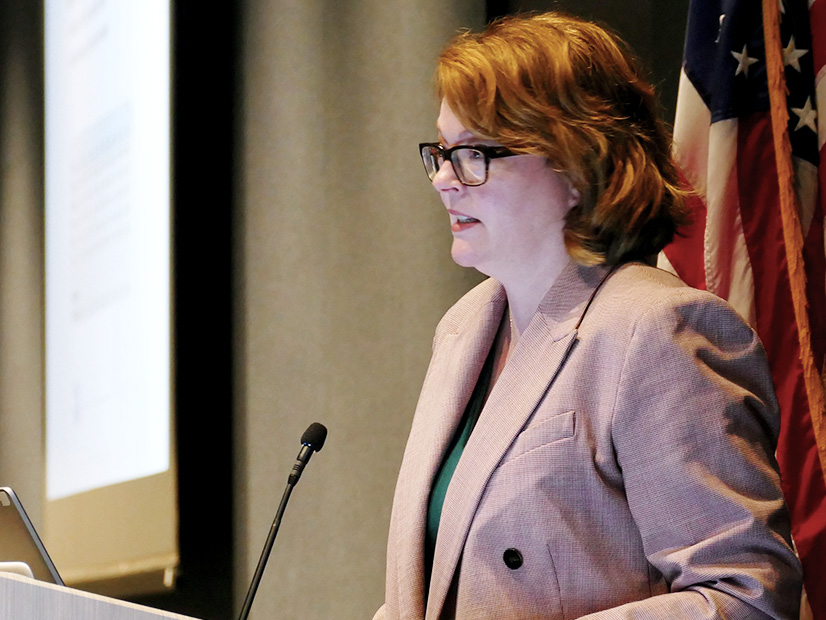The Texas Public Utility Commission and Carrie Bivens both confirmed Thursday that she is resigning as ERCOT’s Independent Market Monitor.
It could be the first of several changes among those responsible for governing and monitoring the Texas grid operator. According to an article by Bloomberg, Will McAdams is “expected” to resign from the commission before the year is up. Rumors swirling in Austin indicate fellow Commissioner Lori Cobos could soon follow him out the door.
Rich Parsons, the PUC’s communications director, said McAdams and Cobos both continue to “serve at the pleasure” of Gov. Greg Abbott (R).
In a call to RTO Insider, McAdams expressed frustration with the Bloomberg story, which cited sources that requested anonymity. It comes as he is focused on preparing the ERCOT and SPP grids for winter; McAdams leads a senior leadership team assessing SPP’s current resource adequacy construct and making policy recommendations.
“I continue, as I have been, to serve at the pleasure of the governor,” he said.
Thomas Gleeson, the commission’s executive director, confirmed Bivens’ pending resignation in a statement.
“Carrie has done a great job as the Independent Market Monitor at a critical time for our state, balancing the urgent need for greater reliability in a way that protects our unique, competitive market,” he wrote, thanking her for her service.
Bivens told RTO Insider the news of her departure was true but declined to comment further.
Potomac Economics’ David Patton said in an email that Bivens resigned from the eight-person IMM to “pursue other opportunities.” He said the deputy director will manage the team while Potomac searches for a new director, but that day-to-day monitoring work will not be affected.
“She was an outstanding director, and we all wish her the best,” he said.
Potomac currently holds ERCOT’s market monitoring contract, which expires in December. The consulting firm is the only respondent to the PUC’s request for proposals to a four-year contract that begins in January.
Parsons said the commission is proceeding through the RFP process and cannot comment on specific details unless or until a contract is signed.
“Let me just say that during her time as the IMM director, Carrie has had to deal with way bigger and thornier issues than either Dan [Jones] or I dealt with,” said Beth Garza, Bivens’ predecessor. Dan Jones preceded Garza, who, like Bivens, resigned her position.
Bivens tangled with both the PUC and ERCOT leadership in recent years. She cast doubt on the performance credit mechanism pushed by former PUC Chair Peter Lake. Last month, she defended an IMM report before the ERCOT board that said its newest ancillary service “likely” raised the real-time market’s energy value by at least $8 billion. (See ERCOT Board, IMM Debate Ancillary Service Costs.)
A departure by either McAdams or Cobos could be more problematic. According to sources in Austin political circles, both have been frustrated with their roles on the commission and the amount of work the state’s lawmakers have sent their way.
“The magnitude and complexity of the PUCT’s responsibilities have increased significantly,” said energy consultant Alison Silverstein, a former PUC and FERC adviser. “If McAdams feels it’s time to move on, then that’s a big loss for the people of Texas and the electric industry. That loss would be compounded if … we lose [Cobos] and her experience and expertise.”
The two commissioners said reports of their departure are false.
“I deeply value and rely on the strong working relationships I have with state leadership and members of the Texas Legislature,” McAdams, a former staffer at the Capitol, said in a statement. “The legislature’s guidance has been and remains invaluable in strengthening the ERCOT grid. I’m also grateful for the additional funding and resources the legislature has granted the PUCT, which allows us to grow and take on more responsibility to ensure Texans have the reliable electric grid they expect and deserve.”
“I remain fully committed to serving on the [PUC] and serving the people of Texas to ensure a reliable, resilient, and affordable supply of electric power,” Cobos said. “I greatly value the important work that the Texas Legislature has accomplished over the past two legislative sessions to help ensure grid reliability in our state and look forward to continuing to work with the Texas Legislature to implement their important legislation.”
This week’s passage of a constitutional amendment that essentially sets up the PUC as a bank managing billions of dollars adds another layer of difficulty to the commission’s responsibilities. (See 2023 Elections Bring Billions for Texas Gas, Dem Wins in Virginia, NJ.)
However, the PUC said lawmakers have provided it with additional funds for a 49-person staff increase, effective Sept. 1. That includes full-time staff devoted to legislation passed during the 2023 session. Salaries account for the bulk of the 56% budget increase for the 2023-2025 biennium.
The commission has added 25 positions since the end of the last session in May, growing its headcount to 225.
“The PUC will continue to add [staff] over the course of the biennium, but it will take time to complete the expected growth,” the commission’s Ellie Breed said in a statement. “In addition to the time it takes to post and fill positions, we need to allow time for onboarding and training new employees in the PUC’s complex subject matter.”
Stoic Energy CEO Doug Lewin said the rumors surrounding the PUC just add to the state’s uncertain regulatory environment.
“Regulatory uncertainty is a is a major problem in ERCOT right now,” he said. “If you look at the huge amount of money in the market, particularly this year, but last year too, these were big years for generators. If you had a strong regulatory signal that the competitive market is going to continue to share it … I think you would be seeing a lot more investment. But I think a lot of what’s happening is they’re like, ‘Is [the market] going to be bad? Is it going to be something we’ve never heard of before? What is this performance credit mechanism?’ So, I do think that regulatory uncertainty is a drag on investment.”
[This story was updated Nov. 11 to add comments from Commissioners McAdams and Cobos.]





